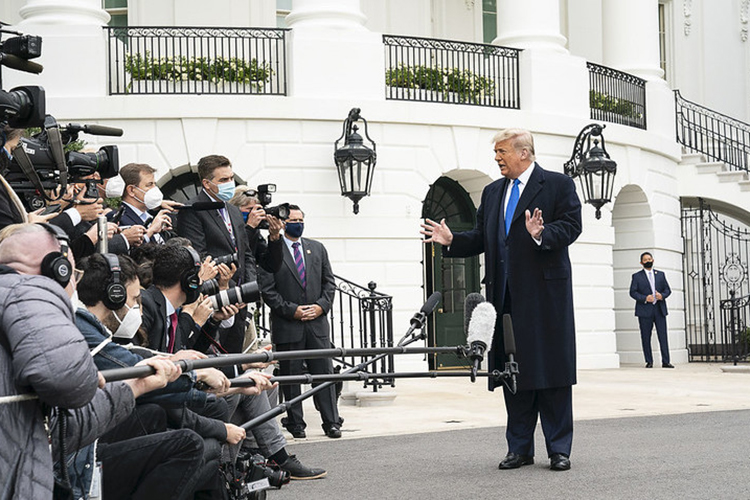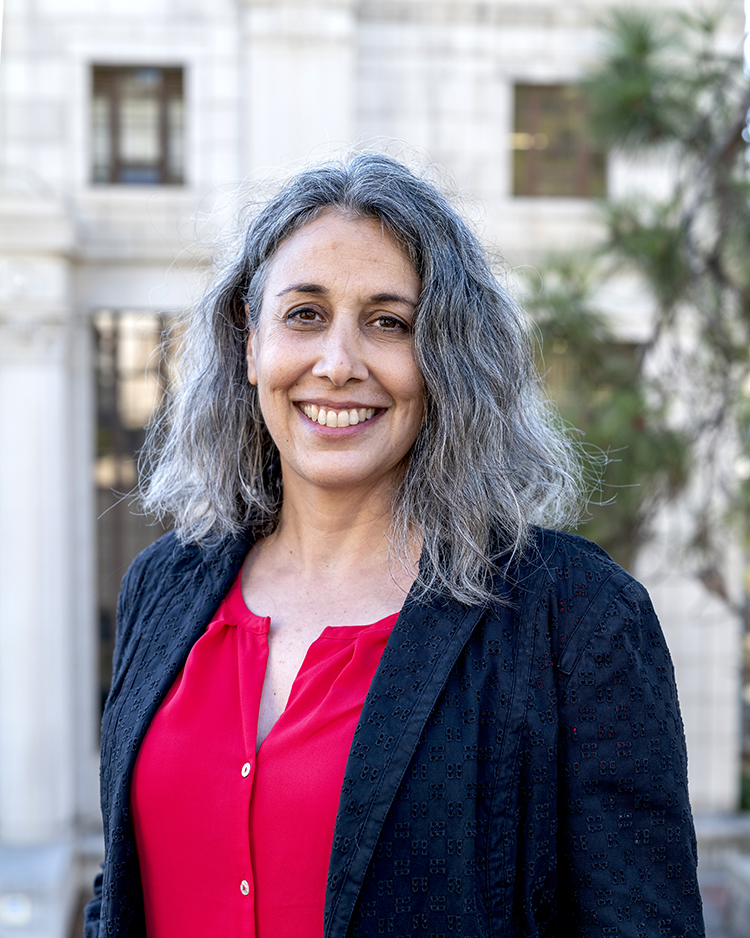How did Trump change American journalism?
Berkeley journalism dean: ‘It's never been clearer that we need the journalism that is important to democracy, that we need to be telling all stories.’
January 27, 2021

Former president Donald J. Trump talks to members of the press on the South Lawn of the White House Oct. 27, 2020. Berkeley Journalism Dean Geeta Anand says Trump’s presidency changed the way reporters and editors covered the White House. (Official White House Photo by Joyce N. Boghosian)
Donald Trump is no longer president. But his administration’s combative nature with the media over the past four years — of which the terms “fake news” and “alternative facts” were used to describe factual reporting — has exacerbated the public’s distrust of American journalists.
But the media is also to blame for that distrust, said UC Berkeley Graduate School of Journalism Dean Geeta Anand. More particularly, the failure of the local news model, and the lack of diversity in the industry, has allowed important reporting and coverage to fall through the cracks.

UC Berkeley Graduate School of Journalism Dean Geeta Anand. (Photo by Wesaam Al-Badry)
“The perception of the media has become that it is this mystical, evil, distant, elitist, judging institution that annoys people,” said Anand. “American journalists do not represent the face of America, … so we’ve missed the story of the alienated rural white voter, and also much of Black America. We’ve lost the trust there. … We need to change the face of journalism.”
Anand and Berkeley journalism hopes to contribute to this change, as the school has recently established a fellowship program with Bay Area news outlets in Richmond, a community long covered by Berkeley journalism students through the publishing site Richmond Confidential.
Berkeley News recently spoke with Anand about the importance of local reporting, the myth of pure objectivity and how journalists changed the way they cover the Oval Office during the Trump era.
How do you feel Trump’s presidency has impacted American journalism?
I think Trump spoke so many falsehoods that it routinely made journalists question many things about the way they do their jobs.
Right after a source or person says something that is clearly a lie, they had to begin to ask the question: Do I immediately report that it’s false, so that the reader, listener or viewer knows that this thing that has just been said is utterly untrue?
The fact-checking, at first, would come later in the story, or later in the day, or later in the week. And editors were thinking, ‘Oh, my God. But the impact of the story has already been felt. How do we do this better?’
You saw journalists struggle because of this in the beginning. It changed the way a news story was formed and told. We started to see that the lies would be fact-checked at the very beginning of the story. And by the end of Trump’s tenure, the fact that he lied became the lead in some stories, stating that he was telling yet another falsehood, with headlines like: President Trump declared, without any evidence, the election was fraudulent.
Do you think this has also impacted what stories were actually covered?

During a controversial press conference at the White House on Nov. 5, former president Donald Trump charged — without evidence — that fraud was robbing him of the election. (AP Photo/Evan Vucci)
It made journalists question whether the president should be covered at all, when he says a total lie that has the potential for having huge repercussions.
For example, he declared that the elections were fraudulent immediately after Election Day. Several news stations just stopped covering his speeches: That is a first in American journalism.
The question we haven’t fully resolved in these four years is: If someone is lying, and if someone is saying things that are very divisive that can cause a lot of violence and harm, should you cover them at all? How much should you amplify that voice?
That’s what journalists are currently wrestling with.
The frequency that social media disseminates information makes it easier for facts and lies to get the same kind of space in the public discourse. Do you think the perception of objectivity in journalism is impacted at all because of this?
There’s a lot of debate about the question of objectivity. I was a foreign correspondent for 10 years in South Asia for the Wall Street Journal and the New York Times, and when you cover other countries, they are always asking, ‘What do you think? Whose side are you on?’ And being trained in journalism in the U.S., my answer was always, ‘We’re not on any one side, we’re here to find out what happened.’
I was in places like Sri Lanka, the Maldives or Bangladesh, and I would be talking to reporters in those countries about objectivity, and they didn’t quite understand what I meant by that. These are countries that have experienced dictators — and wars and devastation from that rule — and they didn’t quite understand what I was talking about — how could we possibly be objective?
I think that’s a similar kind of test that has occurred here in America with the Trump presidency. When someone is tweeting falsehoods, and not operating by the rules of a democracy or the standards that we’ve had for so many decades, you have to change the rules by which you practice journalism, and what you mean by objectivity.
Where I’ve ended up in this discussion is believing that objectivity is a search for the truth. That you come into a story open to what the facts are, and you’re committed to talking to everyone, to all sides.
Where the debate also leads us to is the question of a false equivalency. That’s when you ask whether you give all sides equal space.
The industry has killed off so many local newspapers, … which removes journalism from local communities. The public can’t see how journalism is really done anymore. And that needs to change..”
– Geeta Anand
I think where I come down on this debate is that you shouldn’t give more weight to official sources. You should come into covering a story being open. Delve deeply as a reporter into interviewing all of the witnesses, all of the sides, and then use your judgment as a journalist and human being — based on gathering the information about what happened — and tell the story and cite your sources.
A recent Gallup Poll showed the public’s trust in the media has been on the decline. Trump seemed to perpetuate that disdain or distrust of the media for his own political gain and agenda. How do you think journalists can combat those attempts by political leaders in the future?
The perception of the media has become that it is this mystical, evil, distant, elitist, judging institution that annoys people. But the industry is also to blame, because American journalists do not represent the face of America. We need to change the face of journalism.
That is a hard road ahead, because to become a journalist, it’s difficult to sustain yourself on that kind of low salary. More privileged people become journalists because they have the financial cushion to withstand the low salary in the early years in order to take a job that is interesting and influential.
And because of the lack of diversity in who gets to become a journalist, we’ve missed the story of the alienated rural white voter, and also much of Black America. We’ve lost the trust there.
In the aftermath of George Floyd’s killing and Trump’s presidency, it’s never been clearer that we need the journalism that is important to democracy, that we need to be telling all stories. How can we do that if our journalism doesn’t represent all of America?
How can that be done when newsrooms around the nation are starting to close, downsize or consolidate at an alarming rate?
The Trump administration definitely demonized the media and exacerbated the distrust of the media. But I think the failure of the local news model is to blame.
The industry has killed off so many local newspapers and so much local reporting, and those advertising dollars end up going to social media, which removes journalism from local communities. The public can’t see how journalism is really done anymore.
And that needs to change.
We need to see the bigger newspapers invest in local bureaus again. We need pervasive local reporting, and more nonprofit initiatives to strengthen local reporting. People need to actually know reporters, see them doing their stories and see them covering their communities responsibly, in order to believe in them.
With more local journalism, the public would be seeing a larger array of stories being done. They would see more stories about things that impact their daily lives, because the journalists would have a better relationship with the communities they cover.
What did the attack on the U.S. Capitol by pro-Trump supporters teach us about the future of journalism and democracy?

The insurrection at the U.S. Capitol was covered intensively by news media worldwide. (Video image from BBC TV)
Words matter, and violent speech that encourages people to charge into the Capitol with weapons during a session of Congress can actually lead to real-life violence and death. We now know that we are in a very real crisis. We need to ask whether our free speech laws really work anymore. We need to ask what responsibility social media platforms should have over their content.
One thing for sure is that the platforms cannot be the ones who decide how to regulate their content. They are simply too large and too fundamental to how information travels and our democracy functions for them to operate independently.
I know we hate for government to be asked to solve everything, but who else is going to do it? And what is government but the voice of the people of this country? We need to bring together a diversity of voices and experts to think about how we address the violence and misinformation and polarization of information that has been accelerated by social media.
There are no easy answers, but democracy will have failed if it cannot rise to this new challenge and produce answers.
We need humility, and we need to look for answers to other countries that have done a better job at this than we have. And places like Berkeley can play an important role in accelerating these key conversations, which I look forward to having in the weeks and months ahead.